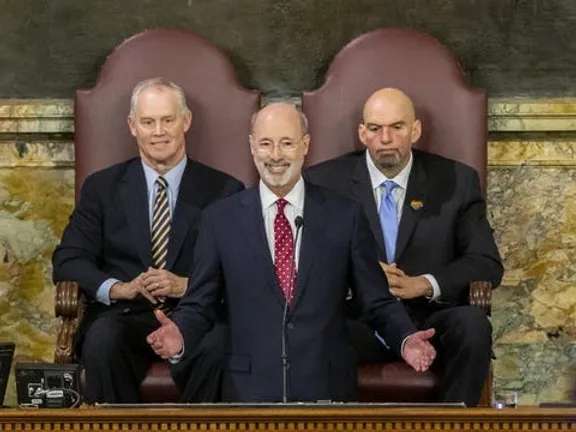
Gov. Tom Wolf unveiled his proposed 2020-21 General Fund budget on Feb. 4 before a joint session of House and Senate members and administration officials.
As they always do this time of year, Republicans and Democrats alike — and even an Independent — from two separate branches of government gathered at the state Capitol Building in Harrisburg for the commonwealth’s annual rite of fiscal passage.
More than just a spending plan, the thousands of pages of briefing documents and spreadsheets represent the governor’s vision for Pennsylvania.
Packaged neatly into a 30-minute, 4,500-word speech, the address not only hits on his key accomplishments over the previous years, but it also presents for the first time the administration’s priorities for the fiscal year that starts July 1.
Among those priorities: Investments in education, child care, workforce development and innovation; an increase in the minimum wage; a renewed call for a severance tax to fund broadband and infrastructure projects; money for Chesapeake Bay cleanup; gun control; and much more. Some old, some new.
There’s plenty to pick from to praise or criticize, and the potshots and applause begins almost as soon as the governor steps from the rostrum and exits the chamber.
It won’t end anytime soon, either.
With his message delivered, the governor hits the road to promote his budget while lawmakers retreat to their caucus rooms for a month-long series of hearings on the math behind the plan.
Always unveiled on the first Tuesday of every February, this year’s budget address was the two-term governor’s sixth.
His plan totals $36.1 billion, an increase of about four percent over current spending. The blueprint does not propose an increase in the state’s sales or personal income tax rates but instead relies on strong economic growth to meet projections. (As of Feb. 1, state revenues were 0.9 percent above expected collections through the first seven months of this fiscal year.)
The next five months mark the slow dance that is budget-making (and deal-making) in Pennsylvania. Here are a few things to watch as the process gets under way:
LAME DUCK SEASON: House Speaker Mike Turzai announced in January that he will retire after his term expires at the end of the year.
As long as he has held the post, Turzai has been a force in budget negotiations, and in busting up negotiated budgets. What role will he play this year, assuming he really stays until the end?
Some within the caucus are already jockeying for his post. Can he continue to keep Republicans in check even as he tries to hold on to power?
The governor is a lame duck, too. But having a few years remaining (with two more budget presentations before term limits put him out of office) is a lot different than potentially a few months, like Turzai.
Senate President Pro Tempore Joe Scarnati may be aiming for the big prize this lame duck season, and with a solid majority, he certainly has the steadiest hand.
LEGISLATIVE RETIREMENTS: The last few election cycles have brought dozens of fresh faces to the General Assembly, as incumbents stepped aside or lost to challengers.
This year, dozens more are calling it quits. At least 14 members of the House of Representatives are not seeking re-election in November. Others could follow before petitions to run are officially filed.
Welcome to the New World Order.
It used to be that men and women in the Legislature stayed in office until power was pried from their hands, or they cleared a path for their heir apparent. Now, they give it up willingly.
What remains to be seen is how these exiting lawmakers – who won’t have to face the electorate (or their leadership) ever again – will vote on the budget or other key issues that could serve as bargaining chips for an eventual budget deal.
Remember, every vote counts.
ELECTION SEASON: Maybe Gov. Wolf really isn’t overly worried about the 2020-21 budget because he’s positioning himself for the next two — when he hopes to have a Democratic majority.
Many of his initiatives have been stalled by the Republican-controlled Legislature.
He may not be able to run for office again, but the governor still has things he wants to do — and he may have several million dollars to give it his best try.
Reports indicate that Wolf’s campaign raised $2.8 million in 2019, the first year of his second term, and had $2.2 million left heading into 2020 to help elect Democrats to the state Legislature.
Will the Republicans want to give the governor any wins in this budget debate, when those wins could be magnified by a sizeable war chest that could help close the margins in swing districts?
TRUMP EVERYTHING: Presidential elections are always a big deal, but this one feels monumental, with the potential to suck all the air out of the room, inside and outside the Capitol.
Call us the Keystone State. Call us a battleground state. It doesn’t make a difference. Just know that Pennsylvania could be at the center of it all.
It’s tough to get anything done in a normal year. And this year is anything but normal, with lawmakers retiring, a Speaker of the House preparing to step down, a governor fighting to secure his legacy, and presidential candidates campaigning around town

The state budget usually wraps up around the Fourth of July. This year could bring some added fireworks.




